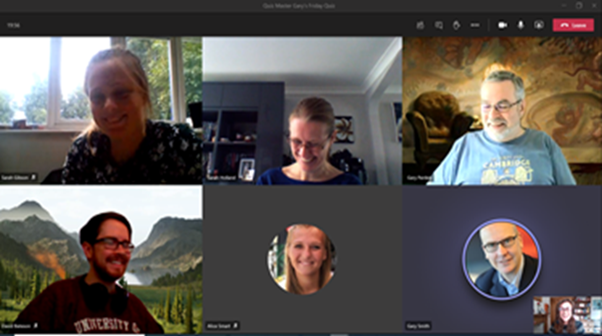Even though we are not together, we are not alone
Saturday 10th October is world mental health day, and this year it seems ever more important. See our tips on how to protect your mental health whilst working from home.
Saturday 10th October is world mental health day, and this year it seems ever more important. 2020 has truly taken the world by surprise. By April, about half of the world’s population was under lockdown, with more than 3.9 billion people in more than 90 countries or territories having been asked, or ordered, to stay at home by their governments. Not only has the world had to come to grips with new, deadly virus, but many of us have had to adapt to the challenges of working from home (WFH).
At PhixFlow we have taken steps to protect our staff’s mental health, which we hope can help everyone, so we have decided to share our tips on how to protect your mental health whilst working from home.
PhixFlow’s tips for working from home
1. Structure your day
With rolling out of bed and into work now a possibility, it can be all too easy to lose all structure in our days. Instead, try and get up before work to shower and get ready. You may even find it helpful to take a quick walk before work, to really get you in the right frame of mind to start the day. Even just getting out of your PJs can really help boost your mood- even if you do look fetching in your monkey onesie.
2. Take breaks
A lot of us feel increasing pressure to be ever present at our laptops, with colleagues no longer able to see you aren’t at your desk there is a presumption we should always be online. Don’t be afraid to take your morning coffee break, or a walk to the shop when things get stressful. Set your status to busy, and if necessary, inform your colleagues that you are taking a 15-minute break.
3. Designate a comfortable workspace
It can be all too tempting to work on the couch, or even in bed. However, this is not practical or healthy in the long term. When setting up your workspace, it is important to think about your posture. You need to be able to sit with both feet on the ground and your back against a chair. If you can, sit near a window, as this can help boost vitamin D and serotonin (the “happy” hormone) levels.
4. Keep your home and work life separate
Try and keep your workspace separated from the rest of your home. This works best if you can set up an office space in the spare room. However, this isn’t always possible, I actually have to work from my bedroom, urgh! Even in such circumstances you can take steps to create a barrier between these two worlds. For instance, when you take a break or go for lunch, do it in a different room. Don’t eat your lunch by your laptop. At the end of your day, pack away your things as this will help you reclaim the space as a place for leisure, not work.
Free Guide Download our free guide to learn the top 5 digital transformation trends for 2021
5 DX Trends Download

5. If safe to do so, try working somewhere else
Being sat in your bedroom or kitchen, all day every day, can become suffocating. Try spending a couple of afternoons in a coffee shop. This is obviously dependent on your work and the restrictions in your area but, if possible, can be a real mood boost.
6. When you switch off, completely switch off
Working from home means that it can seem like we are always at work. It can be tempting to keep working for a few extra hours and to constantly check our emails, even when we have switched off for the day. To stay productive, it is important to keep reasonable working hours, or we risk burning out. Set a time each day that you will finish by and stick to it. When you finish, turn off all work notifications and focus on non-work-related activities.
7. Keep active
Working from home means that we can reasonably not move very far all day. Exercising is an excellent mood booster as it releases endorphins. If you can’t get outside to exercise, use things within your house to work out. This could mean climbing the stairs or doing a YouTube workout in your kitchen.
8. Find ways to unwind
Meditation and mindfulness teach you to slow down racing thoughts, let go of negativity, and clam both your mind and your body. There are some really great, and free, youtube videos that can help get your started. Other options include yoga, arts and crafts, reading, or anything that you enjoy that helps you to relax in a healthy way.
9. Get enough sleep
We have all experienced being extra grumpy after a bad night’s sleep, so it is easy to imagine how repeatedly missing out on sleep can impact your mental health. Getting a good night’s sleep isn’t always easy, especially during periods of stress, such as, say, a global pandemic. Getting into a good sleep routine can improve both the duration and quality of sleep. You can find out more here: https://www.nuffieldhealth.com/article/the-cbt-formula-for-good-sleep
How does work impact our Mental Health?
Work can play a contributing factor towards mental health problems, with one survey finding that 60% of employees have experienced mental health issues due to work or where work was a contributing factor at some point in their career (62% in 2016) [i]. Despite work being a major factor in mental health, MHR found that more than half of all employees believe their employer is showing a lack of concern about their wellbeing or mental health during the current coronavirus lockdown.[ii]
Not only is this lack of concern costing lives, but it is also costing businesses. In 2017, poor employee mental health cost UK employers £42bn, which works out at around £1,300 for every single employee. On the other hand, mental health programmes can generate a return on investment of up to 800%, making it in everyone’s interest to tackle mental health in the workplace.[iii]
Impact of Coivd-19
According to research from Mind, 60% of adults have said that their mental health got worse during lockdown. Lockdown led to many challenges for all of us, from social isolation and financial difficulties, to home schooling and uncertainty.
One aspect of lockdown that has remained, and appears to be staying for the foreseeable future, is working from home. One survey found that 80% of Brits feel working from home has had a negative impact on their mental health[iv].
At first glance, it appears working from home is inherently bad. However, upon closer inspection it appears that it is the way we are managing it that is the problem. Let’s take a deeper look at those results:
- Over a third of homeworkers felt as though they always had to be at their computer to respond quickly, as not being in the physical presence of colleagues means that many people feel unable to take a break and step away from their workstations
- A quarter of those surveyed said that they are struggling to cope with feelings of loneliness and isolation from colleagues
- While video calls can be a great source of social interaction, 1 in 5 stated that they feel pressure to look good on video meetings
This means that, by changing the way we work from home, we can do so in a way that protects our mental health.
What PhixFlow is doing for its employees
At PhixFlow, we have examined our practices and policies to work out how we can best support our staff. Some of what we have come up with may be beneficial in your workplace and we would love for you to steal them. Here is what we have implemented:
Friday Lunch “Pub” Quiz
Every Friday lunchtime we host a virtual pub quiz. It’s important to keep up those social connections in a time when we are all much more isolated, but also to have fun! While I may not win the quiz (I’m pretty sure I came last every time!), it is great to relax and laugh with my colleagues. I am pictured below looking like I’m doing far better than I actually am…

Gym Memberships
Exercising can have a profoundly positive impact on depression and anxiety. It also relieves stress, improves memory, helps your sleep better and boosts overall mood. To help our employees reap these benefits we have given each employee an allowance to be used towards a gym membership, or related activities.
Video use being optional
We recognise that there is real benefit in seeing colleagues, even if it is over a video call. However, the benefits from this start to disappear if employees are forced into the practice. As some can feel pressured to look good over camera, we don’t want to increase stress on our staff. While we will always have the option for video, ensuring that no one feels forced into the practice is key to reaping its benefits.
Updating our sick leave policy
At PhixFlow, we recognise that mental health is as important as physical health. For that reason, we are updating our policies to ensure that our employees can take time off, if needed, when they are experiencing mental health problems.
For more information on mental health and tips on how to look after your mental health please visit mentalhealth.org.uk
1 https://businessinthenews.co.uk/2020/05/22/53-of-employees-say-bosses-dont-care-about-their-wellbeing-and-mental-health/
2 https://www.activehw.co.uk/uploads/bitcmental-health-at-work-report-2017.pdf
3 https://www.mypossibleself.com/blog/mental-health-workplace-uk-crisis-eight-statistics/
4 https://www.nuffieldhealth.com/article/working-from-home-taking-its-toll-on-the-mental-health-relationships-of-the-nation
